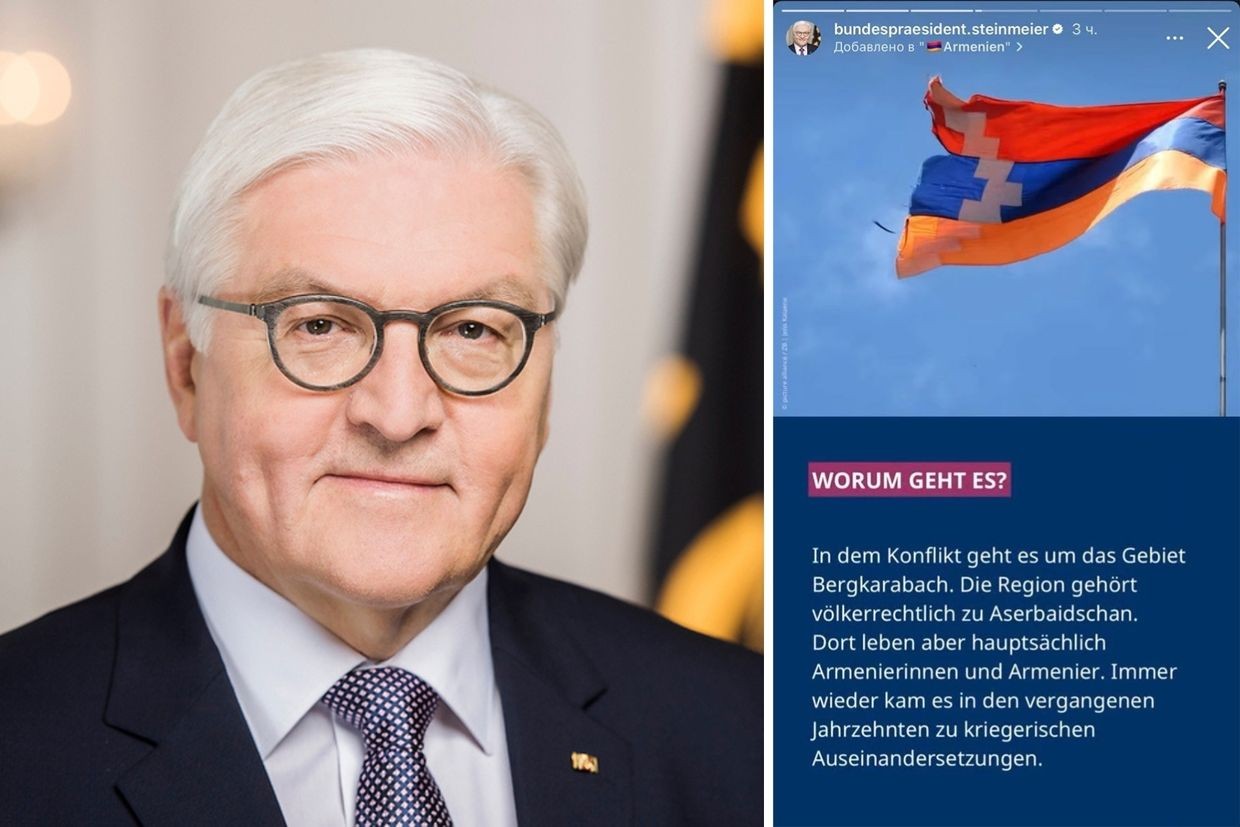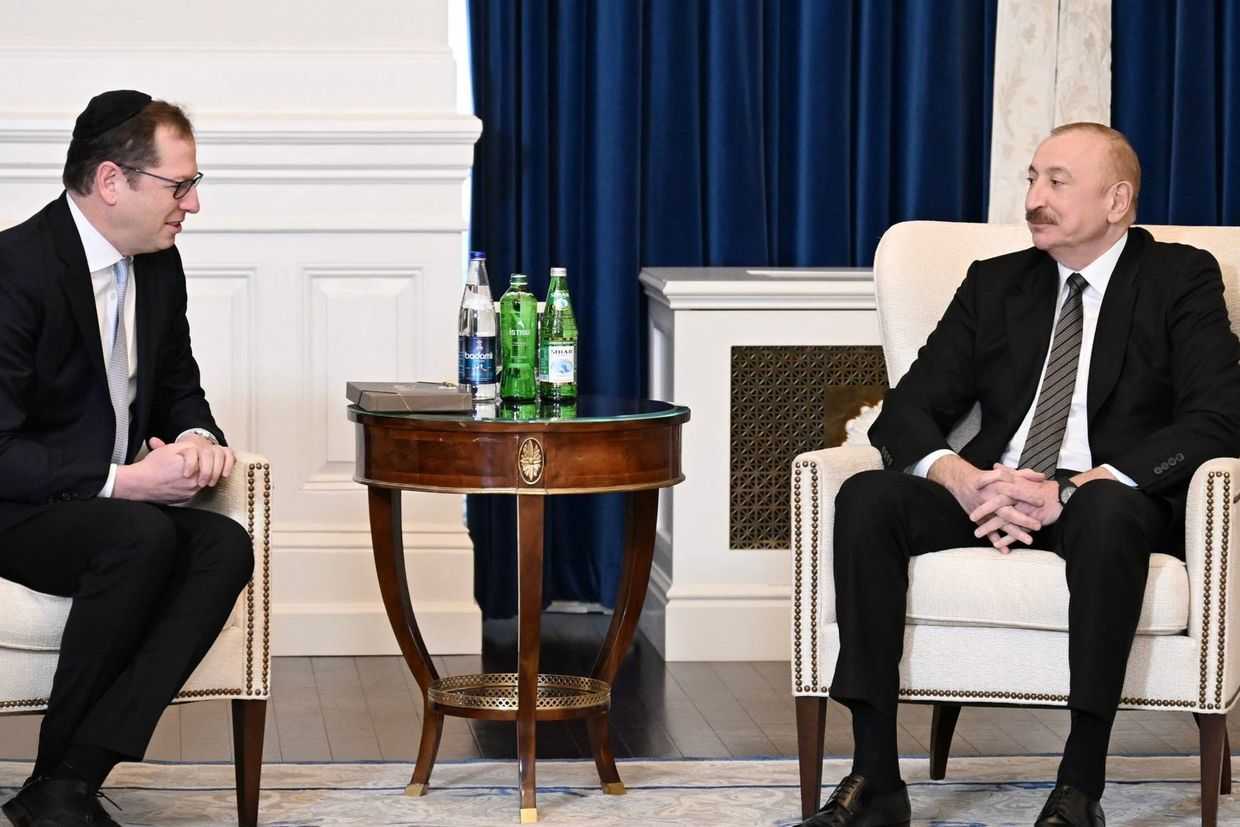
A minor diplomatic crisis has erupted between Azerbaijan and Germany ahead of the first ever visit to Baku by a German President.
On Monday, the day before President Frank-Walter Steinmeier was scheduled to arrive — Azerbaijan summoned the German ambassador, after which the German President’s office issued an apology.
The primary factor leading to the spat was an Instagram post shared by Steinmeier’s official account, coinciding with his visit to the South Caucasus — the previous day, Steinmeier arrived in Armenia, where he is scheduled to stay until Tuesday evening, before flying to Baku.
The post, which was deleted shortly after publication, contained an image of the flag used by the authorities in Nagorno-Karabakh before Azerbaijan took control of the region in 2023.
Below the image of the flag was an accompanying text that read: ‘The conflict concerns the Nagorno-Karabakh region. From the point of view of international law, this region belongs to Azerbaijan. However, Armenians mostly live there. There have been repeated military clashes there over the past decades’.
The Azerbaijani Foreign Ministry called the post ‘unacceptable’ and an ‘open political provocation’, calling for a public apology.
‘It was also highlighted that the German President’s post contradicts [the] statement on support for Azerbaijan’s territorial integrity and sovereignty, and undermines the ongoing peace process’, the Foreign Ministry’s statement continued.
First, German Ambassador to Azerbaijan Ralf Horlemann offered an ‘oral apology’, which Baku accepted, but said was not sufficient.
Following this, Dörte Dinger, head of Germany’s presidential office, issued a formal apology addressed to Azerbaijani presidential aide Hikmat Hajiyev.
‘For a short period of time, the wrong depiction of a flag and the accompanying text in reference to a region of Azerbaijan were published on the Federal President’s social media. Once the mistake was detected, the post was immediately retracted. The post was published due to a technical mistake and bears no significance with regard to Germany’s well-known position on the territorial integrity of Azerbaijan’, the apology read.
‘I am very unhappy about this mistake. I would like to sincerely apologise for the wrong impression the post has created among some people in Azerbaijan. The upcoming visit of the Federal President intends to strengthen the Azerbaijan–German partnership and support the ongoing peace process in the region’.
A Deutsche Welle documentary fans the flames
The spat surrounding Steinmeier’s post came on the heels of another controversial moment in Azerbaijan–German relations, when German public broadcaster Deutsche Welle (DW) published a documentary on the history of the Nagorno-Karabakh conflict on 30 March.
The documentary, entitled ‘Armenia’s Struggle for Land and Identity in the Caucasus’, presented the conflict from an unquestionably pro-Armenian lens — illustrated by the fact that the majority of those interviewed were Armenians, largely from the diaspora. There were no comments from Azerbaijanis in the documentary.
Azerbaijan’s Press Council strongly criticised the film, citing the absence of Azerbaijani voices, which it said ‘demonstrate clear bias and constitute a blatant disregard for professional journalistic ethics’.
The council further said that the documentary’s framing of the conflict as one based on religious divides was ‘deliberately crafted, highly misleading, and dangerous’.
The film was also condemned elsewhere in Azerbaijani media.
The Azerbaijani pro-government media outlet Caliber wrote a strongly-worded critique of both the DW film and Steinmeier’s since-deleted Instagram post, saying the ‘serious mistakes’ make Steinmeier’s trip ‘at risk of ending in a diplomatic scandal’.
The article then went on to describe a plethora of complaints about Steinmeier’s visit to Armenia, as well as other recent German diplomatic statements about the region.
‘There seems to be an excessive number of anti-Azerbaijani actions from [Berlin]. If this is how Germany intends to conduct its policy in the South Caucasus, it will lead to a dead end. And surely, this will be pointed out to Steinmeier during his visit to Baku’, the article concluded.
Steinmeier is scheduled to arrive in Baku on Tuesday evening, and is set to hold talks with Azerbaijani President Ilham Aliyev on Wednesday, following which the two presidents will hold a joint press conference.
For ease of reading, we choose not to use qualifiers such as ‘de facto’, ‘unrecognised’, or ‘partially recognised’ when discussing institutions or political positions within Abkhazia, Nagorno-Karabakh, and South Ossetia. This does not imply a position on their status.











